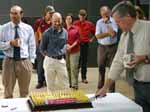 Scientists at Charles Sturt University (CSU) at Wagga Wagga will celebrate the 200th birthday of the ‘father of evolution’, Charles Darwin, whose theory of evolution is one of the most significant advancements in our understanding of the natural world.
Scientists at Charles Sturt University (CSU) at Wagga Wagga will celebrate the 200th birthday of the ‘father of evolution’, Charles Darwin, whose theory of evolution is one of the most significant advancements in our understanding of the natural world. “This breakthrough in scientific understanding still affects many facets of modern life, despite first being published in his seminal and then-controversial book, On the Origins of Species 150 years ago,” says the Dean of the University’s Faculty of Science, Professor Nick Klomp.
CSU will lead regional scientific communities in celebrating Darwin’s birthday at Wagga Wagga on Thursday 12 February, complete with birthday cake. The cake will be cut at 10.30am in the Veterinary Pre-Clinical Centre, building 290, Nathan Cobb Drive near car park 16, at CSU at Wagga Wagga.
Attending the event will be CSU scientists who are using ideas arising from the theory of evolution in their own research. These include:
- Entomologist and PhD student, Ms Cathy Car: “Charles Darwin formulated his theory of evolution after 25 years of amassing evidence collected both on his epic voyage on the Beagle and from the world of domestic animals and plants around him. Darwin became an accomplished naturalist, collecting many specimens and making countless observations. While I am definitely not in the running for formulating any world shaking theories, I am following in Darwin’s tradition in a small way. In my research study, I am collecting, identifying and describing native keeled - or paradoxosomatid - millipede species across NSW. I am also investigating the biogeography of this family and collecting observations on their behaviour and ecology.”
- Researchers of poultry animal magnetism, Dr Nigel Urwin and Dr Rafael Freire: “In animal breeding we use the Darwinian principle of ‘natural selection’ to select elite animals from populations to be parents of the next generation, albeit ‘artificial selection’ in this case. In chickens this has resulted increased productivity by improving growth rates and increasing feed efficiency. But selection is not without draw backs, which include reduced activity and aberrant behaviours in chickens. We are studying how some breeds of chicken can ‘see magnetic fields’ and others not and attempting to determine the genetic basic for this. It is possible that while intensive selection improves populations in some respects, the resulting loss of genes from populations can lead to a loss of normal and natural behaviour patterns. This has major implications for poultry welfare and offers insights into how genes affect behaviour and survival.”
- Senior Research Fellow in Parasitology, Dr David Jenkins: “I work on intestinal parasites of dogs and my main research area is hydatid disease. I have a large research grant to determine the prevalence of rural and peri-rural dog intestinal worms in south east Australia including Tasmania. The study is driven by a desire to determine the distribution of hydatid and the sheep measles tapeworms in rural dogs. These worms are important because they can transfer to people and because hydatid infection is of potential major economic losses to the sheep meat industry.”
- Foundation Professor of Rural Pharmacy Patrick Ball: “Evolution applies to humans, but slowly, and many aspects of human society are changing too fast for our capacity to adapt. Over the centuries there have been many periods of famine and hunger. Those who were best able to store energy in the form of fat survived. In Australia, we have a time of plenty and the population gains weight easily, resulting in an epidemic of obesity and chronic disease. Human populations mostly lived around water, eating large amounts of fish, and a far greater diversity of plants. Our ancestors ate about 600 different plant species but today most of us eat only 50-60. My research looks at chronic disease management, where there is growing evidence that we will have to learn to adapt our lifestyle to more closely reflect our evolutionary background or many of us may die out.”





Social
Explore the world of social